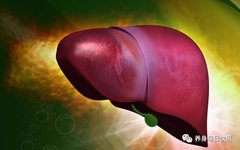The liver is the body’s metabolic organ, often referred to as the “detoxification factory.”
The liver has the function of storing blood, regulating blood flow, and assisting in the metabolism of toxins within the body.
However, nowadays, people are surrounded by numerous complex matters, and mental stress is increasing. Over time, this can affect the liver’s detoxification ability, leading to liver Qi stagnation and the accumulation of heat.
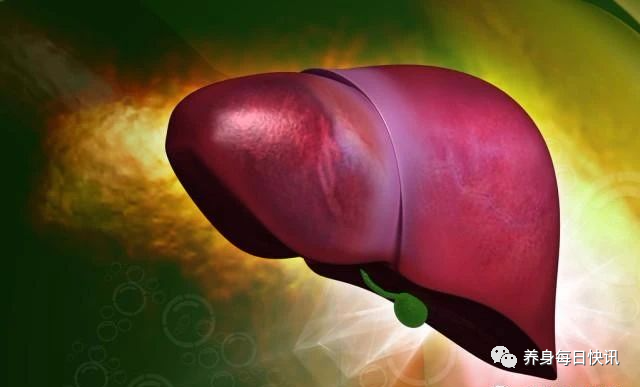
When the liver is damaged and Qi is stagnant, the body may exhibit five signs:
First: Dry Eyes
Generally, after a night’s sleep, one should not wake up with dry eyes; a normal response would be bright and clear eyes, indicating good liver function.
If upon waking, you find your eyes still dry, with blurred vision, light sensitivity, and excessive eye discharge, or if your eyes appear red, it is a warning sign that there may be a problem with the liver, indicating the presence of liver heat that requires attention and care.

Second: Bad Breath
When sleeping with the mouth closed, bacteria can accumulate overnight, leading to less fresh breath. After brushing your teeth, there should be no significant odor.
However, if you wake up with a bitter taste in your mouth and bad breath that does not improve after brushing, and if the breath has a putrid smell, you should be cautious. This may indicate liver dysfunction, where abnormal metabolism increases the levels of urea nitrogen and ammonia in the blood, resulting in a bitter and foul odor in the mouth.

Third: Fatigue
During the night, our liver continues to “work,” repairing, detoxifying, and producing substances. By the next morning, one should feel relaxed and energized, as the body’s toxins have been alleviated.
However, if you still feel tired and restless upon waking, and it is not due to lack of sleep, you should be cautious as this may indicate liver issues.

Fourth: Dark Complexion
Upon waking, one should look in the mirror and see a rosy, glowing complexion.
However, if you wake up with a pale or dark complexion, it is a warning sign. This may indicate liver problems.
Decreased liver function can cause stored iron in the liver to enter the bloodstream, leading to a bluish or dark appearance of the skin. The liver also serves as a blood reservoir; decreased liver function can result in insufficient blood, causing a pale complexion.

Fifth: Insomnia
Good sleep quality means sleeping through the night without insomnia.
Decreased liver function can affect sleep; if there is liver heat, it may lead to symptoms such as palpitations, insomnia, and vivid dreams.
Good sleep benefits the liver, and a healthy liver can promote sleep quality, creating a positive cycle. Therefore, avoid staying up late and refrain from activities that harm the liver.

Three common habits can lead to liver Qi stagnation:
1. Greasy and Spicy Diet
As living conditions improve, people often indulge in rich foods, with meat and fish frequently appearing on the table.
However, frequently consuming greasy foods can burden the liver, leading to poor blood circulation, causing congestion in the liver and pressure on the inferior vena cava, which can result in rising liver heat.
Additionally, spicy foods can exacerbate internal heat, leading to excessive liver heat, which over time can result in liver Qi stagnation.

2. Sedentary Lifestyle
Nowadays, many people work in offices, sitting for long periods with little movement.
However, prolonged sitting can affect blood circulation, leading to insufficient liver blood, hindering the liver’s detoxification processes. Over time, this can exacerbate liver heat.
As time goes on, liver heat can run rampant in the body, leading to liver Qi stagnation.

3. Bottling Up Emotions
As the saying goes, “to get angry is to harm the liver.” For those who are often in a low mood, this can lead to liver Qi stagnation.
When a person is angry, a substance called “catecholamine” is produced, which affects the central nervous system, raising blood sugar levels, increasing the breakdown of fatty acids, and correspondingly increasing toxins in the blood and liver cells.
Over time, this can lead to excessive liver heat and liver Qi stagnation.

To relieve liver Qi stagnation, regularly massage these five acupoints:
1. Tai Chong (Liver 3)
Tai Chong is known as the most important acupoint in the body, often likened to the body’s exhaust valve in TCM. It is the source point of the liver meridian, and massaging and stimulating Tai Chong can eliminate liver Qi and liver heat.
This can maximally disperse the stagnant liver Qi.
Tai Chong is located 4 cm above the space between the big toe. If you experience symptoms of liver Qi stagnation, you can frequently massage Tai Chong to help soothe the liver and regulate Qi.
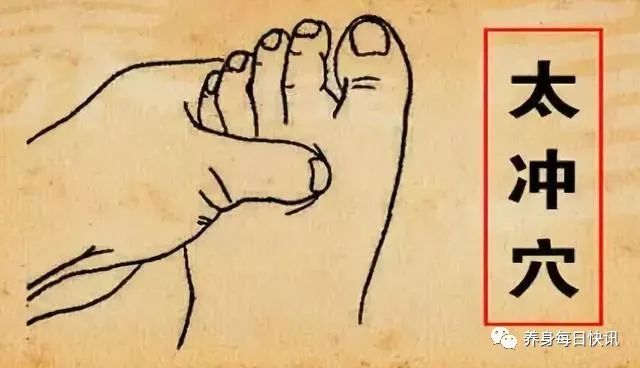
2. Xing Jian (Liver 2)
Xing Jian is located between the big toe and the second toe, and is a fire point. If there is excessive liver heat or liver Qi stagnation, massaging Xing Jian can help to drain heat.
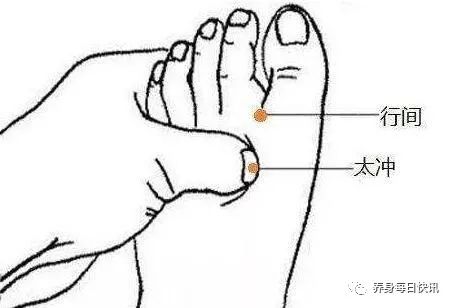
3. Da Dun (Liver 1)
Da Dun is the first acupoint of the liver meridian, located at the edge of the toenail of the big toe. Massaging or moxibustion at Da Dun can clear the liver and brighten the eyes, helping to regulate liver Qi and resolve liver stagnation.
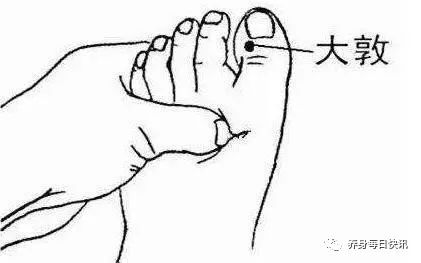
4. Zu San Li (Stomach 36)
Zu San Li is a commonly mentioned acupoint. Massaging or moxibustion at Zu San Li can help regulate the spleen and stomach, tonify the liver and Qi, promote circulation, and dispel wind and dampness. If you have symptoms of liver Qi stagnation, stimulating Zu San Li can help improve the condition.
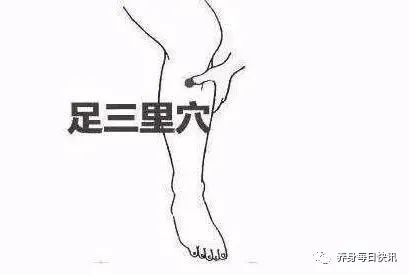
5. San Yin Jiao (Spleen 6)
San Yin Jiao is located three inches above the inner side of the calf. Massaging San Yin Jiao has beneficial effects on the spleen, stomach, kidneys, and liver.
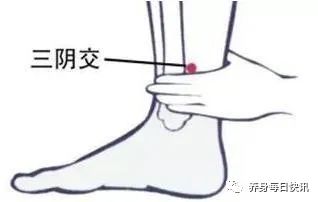
Summary: Six Typical Signs of Liver Qi Stagnation
1. Frequent feelings of depression, anxiety, and anger
2. Bitter taste and dry mouth upon waking
3. Frequent insomnia, nightmares, easily waking up, especially between 1-3 AM
4. Frequent feelings of chest tightness, rib pain, and abdominal bloating
5. Prone to nodules, fibroids, breast nodules, breast fibroids, uterine fibroids, thyroid nodules
6. Women may experience facial spots, breast tenderness before menstruation, dysmenorrhea, and irregular menstruation
If you have more than two of the above signs, it is time to soothe the liver and relieve Qi stagnation.

The liver is the sea of blood, responsible for smooth flow and nourishment. When liver Qi is unobstructed and liver blood is sufficient, one feels calm, sleeps well, and has rosy, healthy skin and shiny hair. To soothe the liver and relieve Qi stagnation, in addition to regularly massaging the five acupoints, the classic formula recommended is: Rose Four Substance Paste.
Ingredients: Rose, Buddha’s Hand, Citron, Goji Berries
1. Rose is known as the number one flower for soothing the liver. Its red color enters the blood, helping to regulate Qi and blood, eliminate liver spots, and beautify the skin.
2. Buddha’s Hand not only soothes the liver and regulates Qi but also dries dampness and transforms phlegm. The fragrance of Buddha’s Hand can awaken the spleen.
3. Citron soothes the liver, relieves Qi stagnation, dries dampness, and transforms phlegm. It works well with Buddha’s Hand, and their combination in many formulas produces synergistic effects.
4. The liver stores blood and requires a large amount of blood for nourishment. Insufficient liver blood can lead to hardening of the liver, making it less supple, similar to parched land cracking. Goji berries nourish the liver and kidneys, enhance vision, and are considered the best material for nourishing liver blood.
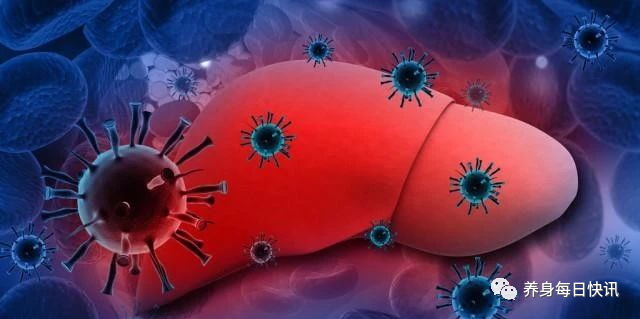
This formula combines the liver-soothing properties of rose, the dampness-drying and phlegm-transforming effects of Buddha’s Hand and citron, along with the blood-nourishing benefits of goji berries, making it a perfect remedy for liver Qi stagnation.

